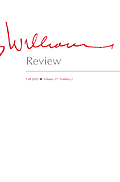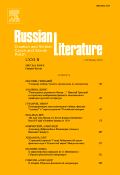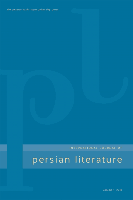
NOVYI MIR
Scope & Guideline
Illuminating Perspectives in Literature and Society
Introduction
Aims and Scopes
- Literary Analysis and Criticism:
The journal frequently publishes critical essays and analyses of both classic and contemporary literary works, focusing on their thematic, stylistic, and cultural significance. - Cultural Studies:
Papers often engage with broader cultural themes, exploring the intersections of literature with social, political, and historical contexts. - Poetry and Prose Contributions:
The journal showcases a wide range of poetry and prose, emphasizing original works and translations that highlight the richness of the literary landscape. - Historical Contextualization:
Many articles delve into the historical backgrounds of literary movements, authors, and specific texts, providing readers with a deeper understanding of their evolution and impact. - Interdisciplinary Approaches:
The journal embraces interdisciplinary methods, incorporating perspectives from philosophy, psychology, sociology, and the visual arts to enrich literary discussions.
Trending and Emerging
- Exploration of Digital and New Media:
There is an increasing interest in how digital platforms and new media influence literature and reading practices, reflecting the changing landscape of literary consumption. - Postmodern and Experimental Literature:
The journal is showcasing more works that engage with postmodern themes and experimental forms, indicating a shift towards more avant-garde literary expressions. - Intersection of Literature and Visual Arts:
Emerging themes often explore the interplay between literature and visual arts, highlighting how these disciplines influence and enrich each other. - Contemporary Social Issues:
Recent publications are increasingly addressing contemporary social issues, including identity, migration, and political discourse, reflecting current societal challenges and their representation in literature. - Global Literary Perspectives:
The journal is expanding its focus to include global literary perspectives, encouraging discussions that transcend national boundaries and engage with international literary movements.
Declining or Waning
- Traditional Historical Narratives:
There is a noticeable decline in papers that strictly focus on traditional historical narratives of Russian literature, indicating a shift towards more contemporary and experimental perspectives. - Biographical Studies of Lesser-Known Authors:
The journal has published fewer biographical studies on lesser-known authors, suggesting a narrowing of focus towards more prominent literary figures and their works. - Conventional Literary Forms:
The exploration of conventional narrative forms and structures seems to be waning, with a growing preference for innovative and avant-garde approaches in literary expression.
Similar Journals

GIORNALE STORICO DELLA LETTERATURA ITALIANA
Delving into the Heart of Italian Literary HistoryGIORNALE STORICO DELLA LETTERATURA ITALIANA is a distinguished journal published by CASA EDITRICE LOESCHER that serves as a critical platform for the exploration and analysis of Italian literary history. With an ISSN of 0017-0496, this journal encompasses a broad spectrum of topics within the field of literature and literary theory, contributing to the academic dialogue surrounding Italy's rich literary heritage. Although it is not openly accessible and has discontinued its coverage in Scopus since 2021, the journal has established its presence in the scholarly community, being ranked in the 18th percentile within the literature and literary theory category. Its historical significance and focus on literature position it as an essential resource for researchers, professionals, and students keen on deepening their understanding of Italian literature and its impact on cultural studies. By engaging with the contents of this journal, readers will gain valuable insights into the evolution of literary discourses and the role of Italian literature in contemporary society.

BULLETIN HISPANIQUE
Connecting Scholars through Cultural and Linguistic ExplorationBULLETIN HISPANIQUE, published by PRESSES UNIV BORDEAUX, is a prominent academic journal dedicated to the interdisciplinary exploration of literature, linguistic studies, and historical analysis related to the Spanish-speaking world. Since its inception in 1972, the journal has established itself as a vital resource for researchers and scholars, achieving notable recognition across various categories—most recently characterized as Q2 in History, Q3 in Linguistics and Language, and Q1 in Literature and Literary Theory for the year 2023. Though it operates under traditional access models, BULLETIN HISPANIQUE maintains a commitment to scholarly excellence, offering insightful articles that contribute to the rich tapestry of cultural and linguistic discourse. With its Scopus rankings reflecting significant academic engagement, the journal serves as an essential platform for dialogue and discovery in the arts and humanities, appealing to a diverse audience of students, professionals, and academics committed to advancing knowledge in these vital fields.

REVISTA DE LITERATURA
Nurturing critical thought in the world of literature.REVISTA DE LITERATURA, published by the Consejo Superior de Investigaciones Científicas (CSIC) in Spain, stands as a beacon of scholarly excellence in the field of Literature and Literary Theory. With an impressive Q1 ranking in its category for 2023, the journal has established a reputable position within the academic community, reflected in its Scopus rank of #427 out of 1106, placing it in the top 61st percentile. Operating under an Open Access model since 2001, it ensures that cutting-edge research on literary texts, theories, and critical practices is freely accessible to all, fostering scholarly dialogue and enhancing the global discourse on literature. The journal’s continuous commitment to advancing literary scholarship from 1996 to 2024 highlights its role in addressing contemporary literary challenges while celebrating diverse voices and ideas. Researchers, professionals, and students alike are encouraged to engage with this vital resource, which not only showcases innovative research but also contributes significantly to the richness of literary studies.

WILLIAM CARLOS WILLIAMS REVIEW
Celebrating the profound impact of a literary pioneer.WILLIAM CARLOS WILLIAMS REVIEW, published by Penn State University Press, is a distinguished academic journal dedicated to the exploration of the life and works of the influential American poet and physician, William Carlos Williams, as well as broader themes in modernist literature. With its ISSN 0196-6286 and E-ISSN 1935-0244, the journal provides a platform for critical essays, scholarly analyses, and innovative research that contribute to the understanding of Williams's contributions to the literary canon and their relevance in contemporary literary studies. Although it is not an Open Access journal, its rigorous editorial standards and commitment to high-quality scholarship make it a valuable resource for researchers, educators, and students in the fields of English literature and cultural studies. By publishing engaging discourse that bridges historical context and modern interpretation, the WILLIAM CARLOS WILLIAMS REVIEW stands out as an essential journal for those interested in the intersections of poetry, medicine, and society.

RUSSIAN LITERATURE
Pioneering Research in Russian Literary StudiesRUSSIAN LITERATURE is a premier academic journal published by ELSEVIER, dedicated to advancing the study of Russian literary traditions, critical theory, and cultural contexts. With an ISSN of 0304-3479 and an E-ISSN of 1878-3678, this journal has firmly established itself as a vital resource in the field, achieving a commendable Q1 ranking in Literature and Literary Theory as of 2023. The journal benefits from a strong impact factor and ranks #178 out of 1106 in the Scopus database, placing it in the 83rd percentile of arts and humanities research. RUSSIAN LITERATURE covers an extensive timeline, converging years from 1971 to 1974 and from 1976 to 2023, reflecting its rich academic lineage. Although not an open-access publication, the journal remains influential among scholars, professionals, and students seeking in-depth analyses and critical insights into Russian literature and literary theory. Its commitment to scholarly rigor makes it an essential read for anyone engaging with the complexities of literary studies.

RIVISTA DI LETTERATURA ITALIANA
Connecting Scholars to the Heart of Italian Literary AnalysisRIVISTA DI LETTERATURA ITALIANA, published by Fabrizio Serra Editore, stands as a prestigious journal in the field of Italian literature, with a focus on critical analysis and the exploration of literary themes, movements, and historical contexts within Italian literary traditions. With an ISSN of 0392-825X and an E-ISSN of 1724-0638, the journal serves as a valuable resource for scholars, professionals, and students seeking to deepen their understanding of Italian literary works and authors. Although it does not currently offer open access, its rigorous peer-review process ensures that all published articles meet high academic standards, contributing to ongoing scholarly discourse. Operating from its base in Pisa, Italy, RIVISTA DI LETTERATURA ITALIANA aims to provide readers with insightful research, fostering a greater appreciation for the rich tapestry of Italian literature.

International Journal of Persian Literature
Illuminating the Rich Tapestry of Persian LiteratureWelcome to the International Journal of Persian Literature, a premier academic publication dedicated to advancing the field of Persian literary studies. Published by PENN STATE UNIV PRESS, this journal serves as a vital platform for scholars and researchers interested in the rich tapestry of Persian literature and its theoretical underpinnings. With an ISSN of 2376-5739 and E-ISSN 2376-5755, it has established its place within the academic community, earning a category ranking of Q3 in Literature and Literary Theory, as well as a commendable Scopus rank of #481 out of 1106. Spanning the years from 2016 to 2023, the journal invites contributions that explore Persian literary texts, cultural contexts, and theoretical frameworks, fostering enriched dialogue and understanding. Although it does not currently offer Open Access, researchers and students alike are encouraged to engage with its content, which represents a significant contribution to the ongoing scholarship in the field.

RUSSKAIA LITERATURA
Unveiling the Rich Tapestry of Russian Literary TheoryRUSSKAIA LITERATURA, published by the esteemed Russian Academy of Sciences and the State Academy of Humanities (GAUGN), is a prominent journal dedicated to the exploration and analysis of Russian literature and literary theory. Since its inception in 2013, the journal has established itself within the academic community as a valuable resource for scholars and students alike, aiming to elevate discourse and critical thought in the field. Although currently categorized in Q4 of Literature and Literary Theory by Scopus, it plays a significant role in fostering a deeper understanding of Russian literary heritage. The journal's commitment to rigor and quality is underscored by its inclusion in internationally recognized databases, making it a relevant venue for contemporary literary scholarship. Researchers and practitioners in the field will find RUSSKAIA LITERATURA an indispensable tool to access vital knowledge and contribute to discussions that resonate within and beyond the Russian context.

Anales de Literatura Hispanoamericana
Illuminating the Path of Hispanic Literary ExplorationAnales de Literatura Hispanoamericana, published by UNIV COMPLUTENSE MADRID, SERVICIO PUBLICACIONES, is a prominent journal dedicated to the field of Hispanic literature and literary theory. With a history of publication spanning from 1996 to 2023, this journal provides an essential platform for scholars and researchers exploring diverse aspects of literature within the Hispanic cultural context. Though it currently operates without an open-access model, its scholarly contributions are vital for advancing the understanding of literary phenomena in Spanish-speaking countries. As a Q3 ranked journal in the Literature and Literary Theory category, it engages a global audience interested in high-quality research, and its Scopus ranking places it among the notable publications in the arts and humanities. The journal aims to foster interdisciplinary dialogue, showcasing innovative research and critical analyses that enhance the appreciation of Hispanic literary heritage. Whether you are a seasoned researcher or an emerging scholar, Anales de Literatura Hispanoamericana serves as a crucial resource for advancing your understanding of the rich tapestry of Hispanic literature.

WALT WHITMAN QUARTERLY REVIEW
Illuminating the Path of American LiteratureWalt Whitman Quarterly Review, an esteemed publication from the University of Iowa, Department of English, serves as a pivotal platform for scholars and enthusiasts dedicated to the exploration of American literature, specifically centered on the works and legacy of Walt Whitman. With an ISSN of 0737-0679 and E-ISSN 2153-3695, this journal has gained recognition in the field of Literature and Literary Theory, currently positioned in Q3 of the 2023 category quartiles. Spanning a converged time frame from 2009 to 2024, the review publishes original research articles, critical essays, and book reviews that foster rich discussions around Whitman's impact on literary discourse. Though it operates under traditional subscription models, the journal is committed to scholarly excellence, evidenced by its Scopus ranking of #710/1106 in its category. Located in the heart of Iowa City, this review stands as a vital resource for researchers, professionals, and students alike, eager to deepen their understanding of Whitman's innovative contributions to literature.